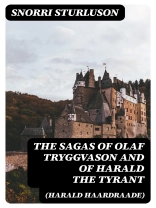In ‘The Sagas of Olaf Tryggvason and of Harald The Tyrant (Harald Haardraade), ‘ Snorri Sturluson masterfully weaves two pivotal narratives that illuminate the complex tapestry of Viking history and Norse mythology. Through an engaging prose style that merges both lyrical storytelling and historical account, Sturluson presents the legendary tales of King Olaf and King Harald, capturing the fervor of their quests for power, religious conversion, and the harsh realities of 11th-century Scandinavia. This work not only reflects the literary context of the Icelandic sagas but also situates itself within the rich oral traditions that informed Viking culture, utilizing a blend of fact and fiction that allows readers to explore themes of heroism, tyranny, and destiny. Sturluson, a 13th-century Icelandic historian, poet, and politician, drew on his profound understanding of his forebears and their lore while writing this saga. His unique position—as a descendant of Viking chieftains amidst the evolving culture of medieval Iceland—granted him insights into both the valor and the vices of these formidable leaders. These works serve as a crucial record of the transition from paganism to Christianity, revealing the cultural and historical imperatives that shaped the narratives. For readers interested in Norse history, mythology, or the evolution of storytelling, this book is an indispensable exploration of Viking identity. Sturluson’s sagas remain compelling texts that resonate with contemporary audiences, offering profound insights into the human condition, societal structures, and the relentless pursuit of legacy.
About the author
Snorri Sturluson (1179–1241) was an Icelandic historian, poet, and politician, remembered most prominently for his contributions to Norse literature and the preservation of early Scandinavian history. A cultured chieftain born into a powerful family in Hvammur, Snorri was as much involved in the turbulent politics of his time as he was devoted to his literary pursuits. Embarking on a career in law, he eventually became the lawspeaker of the Althing, the Icelandic parliament, and his influence expanded through both marital and political alliances. His narrative style, characterized by clarity and vivid imagery, combined historical fact and oral tradition, bringing the ancient Norse world and its mythology to life. Snorri’s literary corpus includes ‘Heimskringla’, a monumental series of sagas recounting the history of Norwegian kings from the legendary to the historical, including ‘The Sagas of Olaf Tryggvason and of Harald The Tyrant (Harald Haardraade)’. The work is not only of literary significance but also a critical source for understanding the Norse era due to the comprehensive genealogical and heroic tales it encompasses. Moreover, Snorri’s ‘Prose Edda’ is an invaluable repository of Old Norse poetics and mythological narratives, earning him the reputation as the foremost mediator of Viking culture and heritage to future generations. Snorri’s legacy is that of a foundational figure in Icelandic letters, whose works remain essential to both medieval studies and the understanding of Norse cultural identity.












